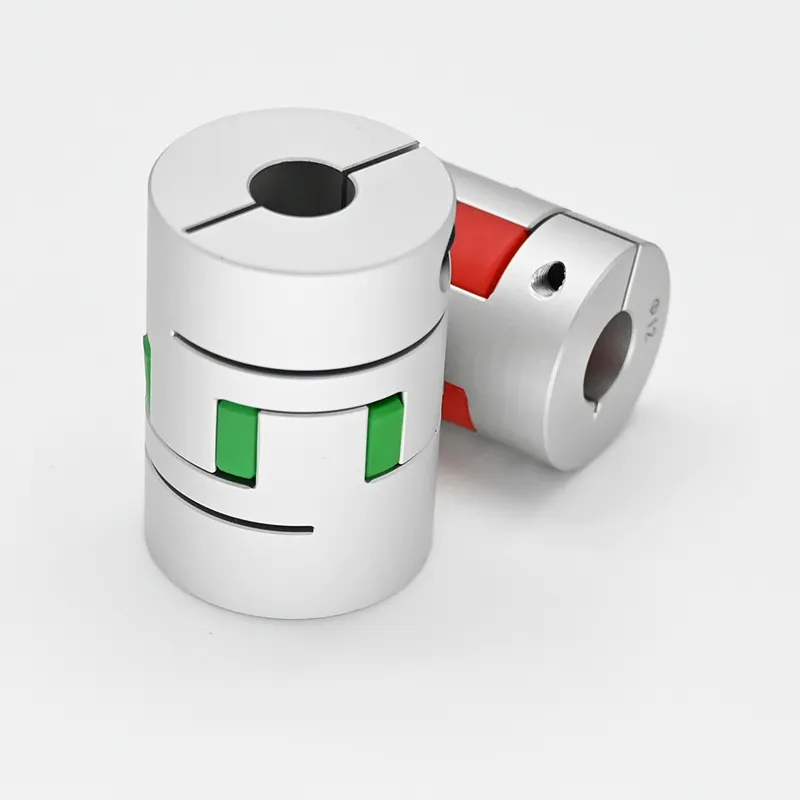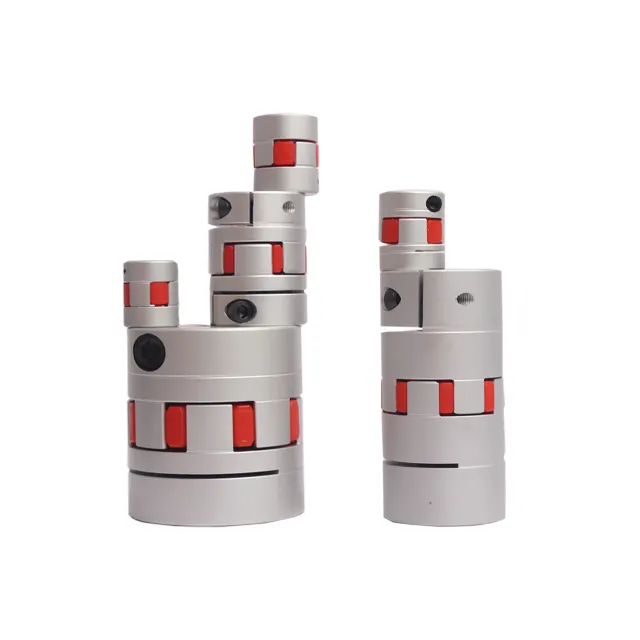Product Description
CHINAMFG SG7-ML black carbon steel good shock buffering capability and insulation curved jaw-type flexible coupling
What is a coupling:
A Coupling is a mechanical element used to connect 2 shafts or drives so that they can transmit rotation or motion. Couplings are usually used to solve the problem of alignment between different coaxes, while allowing a certain degree of axial, radial or angular error, thus ensuring a stable transmission effect.
Coupling is widely used in the shaft transmission of various mechanical devices, such as water pump, fan, compressor, hydraulic machinery, petroleum machinery, printing machinery, textile machinery, chemical machinery, mining machinery, metallurgical machinery, steam turbine, piston type power mechanical transmission system, tracked vehicles, generator sets of high-speed high-power mechanical transmission system, through dynamic balance, Couplings are widely used in high-speed transmission shafting.
Advantages of Shangkun coupling:
Strong ability to compensate two-axis dislocation and radial displacement, can achieve a large range of axial, radial and angular displacement in a small space, simple structure, easy to maintain.
obvious damping effect, no noise, no wear, can work in harsh environment.
High transmission efficiency, up to 99.86%, especially suitable for high-speed high-power transmission.
simple structure, light weight, small size, convenient disassembly, without moving the machine can be assembled and disassembled, without lubrication.
Speed can be accurately transmitted, no slip, can be used for precision machinery transmission.
FAQ:
Q. Are you a factory ?
A :Yes, we are factory and we specialized in industrial locks more than 10 years.
Q.Do you provide samples? Is it free or extral ?
A: Yes , we could offer the samples for free charge but do not pay the cost of freight .
Q . What’s your packing?
A:two type: paper box :30 pcs in 1 carton,blister: 6pcs in 1 middle box, 4middle boxes in 1 carton
Q. What’s your terms of payment ?
A: 30% deposit , 70% balance before shipment.
Q. What’s your delivery time ?
A:7-15days after receiving the order for standard products.
Q.Can we visit your factory?
A:You are welcome to visit our factory , just inform us before you coming, we will give you some information about how to get there.
Thank you for your visit our product
Company:Xihu (West Lake) Dis.Guan ShangKun Industrial Technology Co.,LTD
Address: No.39, Shi Chang Road ,Zhuan Yao Industrial Area, Xihu (West Lake) Dis.Cheng District, Xihu (West Lake) Dis.Guan, ZheJiang , China
Attn: Phoebe
/* January 22, 2571 19:08:37 */!function(){function s(e,r){var a,o={};try{e&&e.split(“,”).forEach(function(e,t){e&&(a=e.match(/(.*?):(.*)$/))&&1

Use of Jaw Couplings in Food Processing and Pharmaceutical Industries
Jaw couplings can be used in food processing and pharmaceutical industries under certain conditions and with the appropriate materials and design considerations. These industries have strict regulations and requirements regarding hygiene, contamination prevention, and cleanability. Here are some key factors to consider:
- Material Selection: For applications in food processing and pharmaceutical industries, jaw couplings must be made from materials that meet FDA and/or other regulatory standards for food contact and pharmaceutical use. Stainless steel or FDA-approved plastics are commonly used in such applications.
- Cleanability: The design of the jaw coupling should allow for easy cleaning and sanitization. Smooth surfaces and minimal crevices help prevent the accumulation of debris and bacteria. Hygienic designs are crucial to ensure compliance with industry standards.
- Sealing: Proper sealing is essential to prevent any lubricants or contaminants from escaping the coupling and coming into contact with the processed materials. Seal materials must be compatible with the substances used in the industry.
- Corrosion Resistance: In food processing and pharmaceutical environments, equipment is often subjected to aggressive cleaning agents and chemicals. Jaw couplings must be corrosion-resistant to withstand these harsh conditions and maintain their performance over time.
- Compliance with Regulations: Industries such as food processing and pharmaceuticals have specific regulatory standards, such as those set by the FDA (Food and Drug Administration) or other relevant authorities. The jaw couplings used in these applications must meet all necessary regulations to ensure product safety and consumer confidence.
It is important to note that while jaw couplings can be suitable for certain applications in food processing and pharmaceutical industries, it is essential to work closely with coupling manufacturers and suppliers to ensure that the selected couplings meet all industry-specific requirements and standards. Additionally, regular maintenance and inspection should be carried out to ensure the couplings continue to perform as expected and comply with hygiene and safety regulations.

Can jaw couplings be used in heavy-duty applications such as mining and construction?
Yes, jaw couplings can be used in heavy-duty applications such as mining and construction, but their suitability depends on various factors. Jaw couplings are commonly employed in a wide range of industrial applications due to their versatility and ability to handle misalignment. However, when considering their usage in heavy-duty environments, several important aspects need to be taken into account:
- Torque and Power Requirements: Heavy-duty applications often involve high torque and power demands. It is crucial to ensure that the selected jaw coupling is rated to handle the specific torque and power levels encountered in the mining and construction machinery. Choosing a coupling with a sufficient torque capacity ensures reliable power transmission without premature failure.
- Material Strength: The materials used in the construction of jaw couplings play a critical role in their ability to withstand heavy-duty applications. Couplings made from robust materials, such as high-strength steel or alloy materials, are better suited for withstanding the demanding conditions found in mining and construction equipment.
- Impact and Shock Resistance: Mining and construction applications involve significant levels of impact and shock loads due to the nature of the work. The jaw coupling must be designed to handle these dynamic loads without compromising its structural integrity. Some jaw couplings feature specially designed elastomers or flexible elements that provide additional shock absorption and reduce the transmitted impact forces.
- Dust and Debris Management: Heavy-duty environments like mining and construction sites often contain high levels of dust, dirt, and debris. These particles can accumulate on the coupling surfaces and lead to premature wear and reduced performance. Selecting jaw couplings with appropriate sealing mechanisms or protective covers can help minimize the ingress of contaminants and extend the coupling’s life in such environments.
- Maintenance and Inspection: Regular maintenance and inspection are crucial in heavy-duty applications to identify any signs of wear, misalignment, or damage to the coupling. Proper maintenance practices can prevent unexpected failures and ensure the equipment operates efficiently and safely.
When considering the use of jaw couplings in heavy-duty applications like mining and construction, it is essential to consult with coupling manufacturers or engineering experts to select the appropriate coupling type and size for the specific application. Some heavy-duty applications might require more specialized coupling designs, such as grid couplings, gear couplings, or disc couplings, which are explicitly engineered for extreme conditions and higher torque capacities. Additionally, following the manufacturer’s guidelines and recommendations for coupling installation, maintenance, and operating parameters is critical to ensure reliable and safe operation in heavy-duty environments.

Selecting the Appropriate Jaw Coupling Size
Choosing the right jaw coupling size for a specific application involves considering several factors:
- Torque Requirements: Determine the maximum torque that the coupling will need to transmit in the application. Make sure to account for any peak or intermittent loads.
- Shaft Diameter: Measure the diameter of the shafts to be connected. The coupling’s bore size should match the shaft diameter for proper fit and secure power transmission.
- Speed: Consider the rotational speed of the application. High-speed applications may require special high-speed jaw couplings.
- Misalignment Compensation: Evaluate the level of misalignment present in the system, including angular, parallel, and axial misalignment. Choose a jaw coupling with appropriate misalignment capabilities to avoid premature wear and failures.
- Environmental Factors: Assess the environmental conditions, such as temperature, humidity, and presence of chemicals or contaminants, as these factors can impact the coupling’s material selection and performance.
- Service Factors: Some applications may have service factors that affect the required torque capacity. Apply service factors as needed to ensure the coupling can handle the application’s demands.
- Space Constraints: Consider the available space for the coupling. Ensure that the selected jaw coupling can fit within the given space constraints.
- Compliance with Standards: If applicable, verify that the chosen jaw coupling meets industry or application-specific standards and regulations.
By taking these factors into account, engineers and designers can determine the appropriate jaw coupling size that will provide reliable and efficient power transmission in the specific application.


editor by CX 2024-05-08